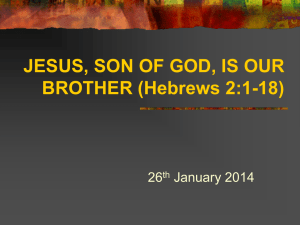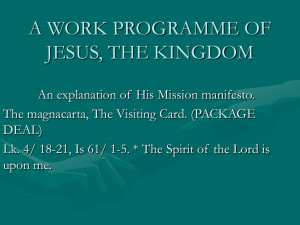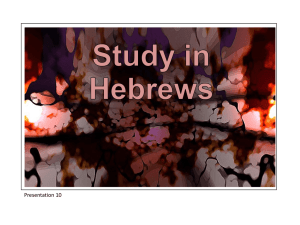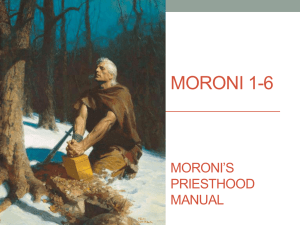A Priest After the Order of Melchizedek
advertisement
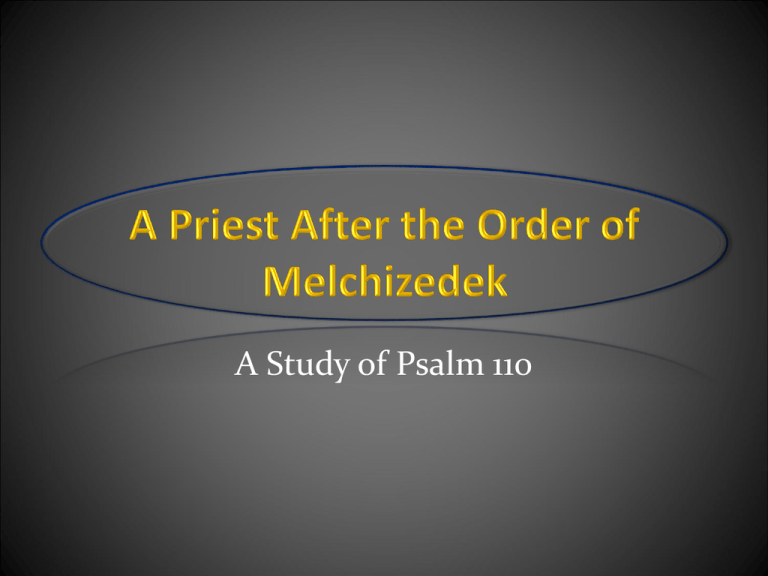
A Study of Psalm 110 • Moses records the blessing of Melchizedek upon Abraham (Gen. 14:17-20) • Jesus refers to David’s psalm (Mt. 22:41-46; Mk. 12:35-37; Lk. 20:41-44) • Peter refers to David’s psalm (Acts 2:34-35) • The author of Hebrews refers to David’s psalm and Melchizedek… – To show Jesus has an appointed priesthood (Heb. 5:5-10) – To show Jesus has an endless priesthood (Heb. 6:19 – 7:10) – To show Jesus has a new (law) priesthood (Heb. 7:11-19) • The author of Hebrews refers to David’s psalm and Melchizedek… – To show Jesus has a sure (with an oath) priesthood (Heb. 7:20-25) 1Jehovah saith unto my Lord, Sit thou at my right hand, Until I make thine enemies thy footstool. 2 Jehovah will send forth the rod of thy strength out of Zion: Rule thou in the midst of thine enemies. 3 Thy people offer themselves willingly In the day of thy power, in holy array: Out of the womb of the morning Thou hast the dew of thy youth. 4 Jehovah hath sworn, and will not repent: Thou art a priest for ever After the order of Melchizedek. 5 The Lord at thy right hand Will strike through kings in the day of his wrath. 6 He will judge among the nations, He will fill the places with dead bodies; He will strike through the head in many countries. 7 He will drink of the brook in the way: Therefore will he lift up the head. • “Jehovah saith unto my Lord” – God the Father (Jehovah) spoke to Jesus (my Lord) • “Sit thou at my right hand…” – Jesus sits at a position of authority and power (Mt. 26:64; Acts 5:31; 7:55; Rom. 8:34; Eph. 1:20; Col. 3:1; Heb. 1:3; 8:1; 12:2; 1 Pet. 3:22) • “Until I make thine enemies thy footstool” – All opposed to Jesus are his enemies and they will be ruled over by Jesus (1 Cor. 15:25-26; Heb. 1:13; 2:8; 10:12-13) • “Jehovah will send forth the rod of thy strength out of Zion” – God the Father will cause Jesus to rule with strength beginning in Jerusalem (Rev. 2:27; 12:5; 19:15 • “Rule thou in the midst of thine enemies” – Jesus rules over all who are opposed to him and enemies (Psa. 2:9; Dan. 7:13-14; Lk. 1:32-33; Rev. 11:15) • “Thy people offer themselves willing” – The faithful who serve Jesus do so willingly (Judges 5:2,9; 1 Chron. 29:5,6,9,14,17; Ezra 1:6; 2:68; 3:5; 7:16; Neh. 11:2; 2 Cor. 8:5; Phil. 2:13; 1 Pet. 5:2) • “In the day of thy power, in holy array” – The faithful who serve Jesus do so with holiness (1 Chron. 16:29; Psa. 29:2; 96:9; 1 Thess. 4:7; Tit. 2:14) • “Out of the womb of the morning Thou has the dew of thy youth” – Jesus will shower his people blessings (Mic. 5:7) • “Jehovah hath sworn, and will not repent” – God does not change like man does (Num. 23:19; Mal. 3:6) • “Thou art a priest forever after the order of Melchizedek” – Jesus is a King (v. 2), a Priest (v. 4), and a Judge (v. 6). Jesus’ priesthood is forever (Zech. 6:12-13; Rev. 1:6) • “The Lord at thy right hand will strike through kings ” – Jesus has the power to strike through kings (Rev. 17:12-14; 19:11-21) • “In the day of his wrath” – Jesus is capable of love and wrath (Psalm 2:5,12; Rom. 2:5; Rev. 6:15-17) • “He will judge among the nations” – Jesus will judge through his word (Isa. 2:4; Mic. 4:3), through his apostles (Mt. 19:28), and through his control over nations • “He will fill the places with dead bodies” – Jesus will punish with death those who transgress (Isa. 66:24; Rev. 14:19-20) • “He will strike through the head in many countries” – Jesus will ruler over the rulers and will be king over the kings (Gen. 3:15; Isa. 9:4-5) • “He will drink of the brook in the way: Therefore will he lift up the head” – Jesus suffered but was lifted up to glory (Lk. 24:26; Phil. 2:7-11; Heb. 2:9; 1 Pet. 1:11)





